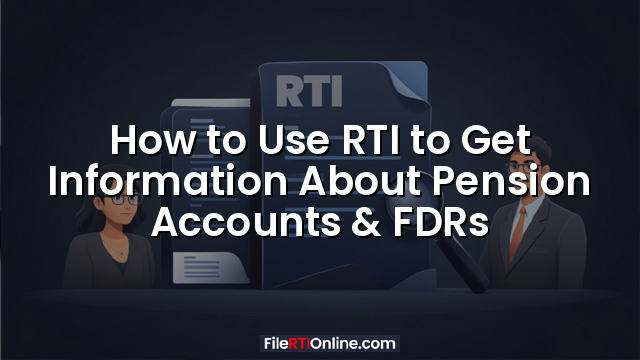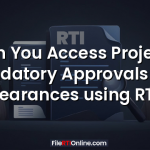How to Use RTI to Get Information About Pension Accounts & FDRs
Many people file RTI applications to obtain details of pension savings accounts, fixed deposit receipts (FDRs), or documents related to deceased family members’ bank accounts. However, banks often deny such information citing privacy and fiduciary grounds.
Here is how RTI works in such cases — and when information will or will not be given — explained with a real Central Information Commission (CIC) case.
Case Example: RTI for Pension Account & FDR Details Denied
Background of the Case
An appellant filed an RTI application with Punjab National Bank (PNB) asking for:
- Details of a pension savings account
- Fixed Deposit Receipt (FDR) information
- A copy of an affidavit submitted with certain cheques
The bank denied the information under:
- Section 8(1)(d) – Commercial confidence / fiduciary information
- Section 8(1)(j) – Personal information and privacy of a third party
Why the Bank Refused?
During the CIC hearing, PNB explained:
- The pension account belonged to the appellant’s father, not him.
- Another son (the appellant’s brother) was the nominee for the account.
- The brother had submitted an affidavit and cheques as part of formal banking procedures.
- Since the appellant was not the account holder, nor a nominee, he could not access another person’s bank documents.
PNB argued that the requested documents involved:
- Personal information
- Fiduciary relationship
- Third-party privacy
Therefore, the bank denied disclosure.
CIC’s Decision
The Central Information Commission agreed with the bank and held that:
- The information was personal to the account holder and the nominee.
- The appellant had no legal standing to seek these records under RTI.
- Sections 8(1)(d) and 8(1)(j) were correctly applied.
👉 Result: The appeal was rejected. No information was provided.
What You Can Learn From This Case
This case shows that RTI cannot be used to access:
- Another person’s bank account details
- FDR information of someone else
- Affidavits or cheques submitted different family member
- Nominee-related documents
Even if you are a legal heir, banks cannot disclose such information through RTI unless:
- You are the nominee, or
- You have a succession certificate / legal heir certificate, or
- There is a court order authorizing access
RTI is not a substitute for banking succession procedures.
When RTI Can Help in Bank-Related Matters
You can use RTI for:
✔️ Status of your own pension account
✔️ Details of your own FDRs
✔️ Rules/policies followed bank
✔️ Norms for settling deceased claims
✔️ Timeline and process for nomination updates
✔️ Whether a particular document was received (without sharing contents)
When RTI Will Not Help
RTI will not provide:
❌ Another person’s account statements
❌ Nominee details (unless you are the account holder)
❌ FDR copies of someone else
❌ Submitted affidavits/cheques of a third party
❌ Information that causes privacy invasion
These are protected under:
- Section 8(1)(j) – Personal information
- Section 8(1)(d) – Fiduciary/third-party information
Summary
|
What Was Sought? |
Pension account + FDR details + affidavit copy |
|
Why Denied? |
Third-party personal info + fiduciary info |
|
CIC Decision |
Bank was right; appeal rejected |
|
Lesson |
RTI cannot override banking privacy rules |


